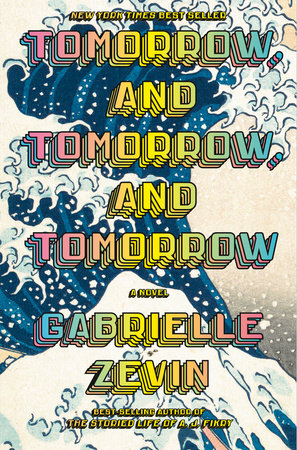Tomorrow, and Tomorrow, and Tomorrow Reader’s Guide
By Gabrielle Zevin


1. Describe the types of “love” shared among Sadie, Sam, and Marx. What catalyzes the shifts in their relationships over the years? Consider Sadie’s explanation to Sam about why they never got together: “Lovers are . . . common. Because I loved working with you better than I liked the idea of making love to you. Because true collaborators in this life are rare” (page 393).
2. How does Dov set the standards for Sadie’s work as a game designer, as a woman, and as a wife/partner to both Sam and Marx? What compels her to keep him in her life even after they break up?
3. Sadie considers how their experience as designers would have been different if they were born a decade (more or less) before or after when they were born. Technological advances aside, what else would have been different about their story if it was shifted slightly in time? Consider Sadie and Dov’s relationship, the options for Sam’s foot, the proliferation of mass shootings, and other cultural and social events.
4. Marx’s main creative role is as an actor, which is limited to his time in college. How does he continue to contribute to the creative process with Sam and Sadie—as producer, muse, organizer, and more? What does his participation suggest about the various ways in which one participates in art beyond being an artist?
5. If you were in their shoes, would you have taken the deal with Cellar Door Games or Opus Interactive to produce Ichigo? How would the novel have turned out differently if they had chosen Cellar Door?
6. How does Sam’s foot—while it’s injured and after it’s been amputated—shape his sense of self? Consider his reflections on gender, sexuality, and pain, including how he constructs his avatar as Mayor Mazer. How do the sensitivities of his relationship with this part of his body improve and damage his relationships with the people he loves?
7. The novel bends its narrative form to assume the structure of the games in various places—namely, Both Sides, the NPC, and Pioneers sections. How did your reading experience shift in those sections? Did the format enhance your immersion into the worlds the team was building, even through text alone?
8. Sam suffers numerous losses in the book—his mother, Anna; his friend and partner, Marx; his foot; his relationship with Sadie; his grandfather. How does gaming help him cope with his thoughts about his mother: “There are, he determines, infinite ways his mother doesn’t die that night and only one way she does” (page 172)?
9. Whom do you think deserves more creative credit for Ichigo and Mapleworld, their two most successful ventures—Sam or Sadie? How does the media’s interpretation of Sam as Ichigo and Mayor Mazer affect their working dynamic?
10. Do you think Sadie and Sam regret the choices they made for Mapleworld, given how the game’s political voice led to Marx’s death? Do you think Marx had any regrets?
11. What alternative “plays” during the shooting at Unfair Games could have caused Marx to live?
12. Marx muses while in his coma: “Memory, you realized long ago, is a game that a healthy-brained person can play all the time, and the game of memory is won or lost on one criterion: Do you leave the formation of memories to happenstance, or do you decide to remember?” (page 286). What do the characters in the novel decide to remember through their games? Do they acknowledge the role and value of happenstance in the creation of their real world and their imagined worlds?
13. From the title of the novel, to Sadie’s invocation of Emily Dickinson, to Marx’s epithet, “Tamer of Horses,” to Master of the Revels, there are many allusions to classical literature woven throughout the novel. What does this suggest about the nature of storytelling—how many ways can the same stories, emotions, and experiences be reinvented? Does the team believe they can create and are creating something new in their work, or are they finding new ways of expressing universal themes? What do video games offer a person in the form of entertainment, community, and growth that a play, a poem, or other art forms do not?
14. Discuss how the other game designers that join Unfair Games—Ant and Simon, and the Worths—contribute to the plot of the novel. What would they be if the novel was a video game?
15. What does taking over Dov’s class at MIT help Sadie understand about her life path, including the motives and conditions that helped her make Ichigo, as prompted by her conversation with Destiny?
16. Sadie notes that the kids in her class have a very different attitude toward telling their stories, in life and in games, compared to when she was growing up in the 1980s. How have you observed similar shifts within your own families and communities? How has technology shaped our modes of expression, sense of self-worth, and value systems, especially among teenagers?
17. What video games have you formed an attachment to in your life, as a child and/or as an adult? What about the gameplay, story, or characters drew you in and left an impression on you?
18. Both Sadie and Sam use games to explicitly memorialize their loved ones and process their losses. If you could design a game to change or preserve some part of your reality, what would it be like?
Just for joining you’ll get personalized recommendations on your dashboard daily and features only for members.
Find Out More Join Now Sign In